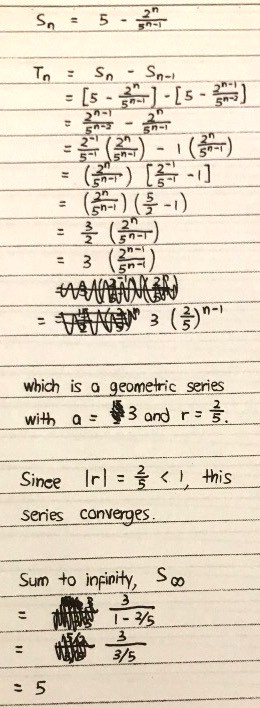Ask Singapore Homework?
Upload a photo of a Singapore homework and someone will email you the solution for free.

Question
junior college 1 | H2 Maths
One Answer Below
Anyone can contribute an answer, even non-tutors.

Please help!!!! Thank you!!!
= 5 - 2ⁿ/(5ⁿ(5‾¹))
= 5 - 5(2ⁿ)/5ⁿ
= 5 - 5(2/5)ⁿ
= 5(1 - (2/5)ⁿ)
= 5(1 - 2/5)(1 - (2/5)ⁿ)/(1 - 2/5)
= 3(1 - (2/5)ⁿ)/(1 - 2/5)
The sum of the first n terms of this series can be rewritten as the expression for the the sum of the first n terms of a geometric series
Sn = a(1 - rⁿ)/(1 - r)
having the first term, a = 3
and common ratio, r = 2/5
Therefore the series is a geometric series.
ii)
Since |r| = |2/5| = 2/5 < 1,
the series converges as each subsequent term is smaller than the previous (technically a proper fraction of the previous term), i.e the terms are getting smaller as n increases.
Sum to infinity, S∞
= a/(1 - r)
= 3/(1 - 2/5)
= 3/(3/5)
= 3 x 5/3
= 5
Funny thing is, i remember the sum formula but the basic Tn = Sn - S(n-1) didn't cross my mind at all
...the starting number A times R raised to the power of (n - 1).
It’s not power n, because the starting term is A, which is the same as A times R^(1 - 1) where n = 1 represents the first term. I made this error the first time.
See 1 Answer





